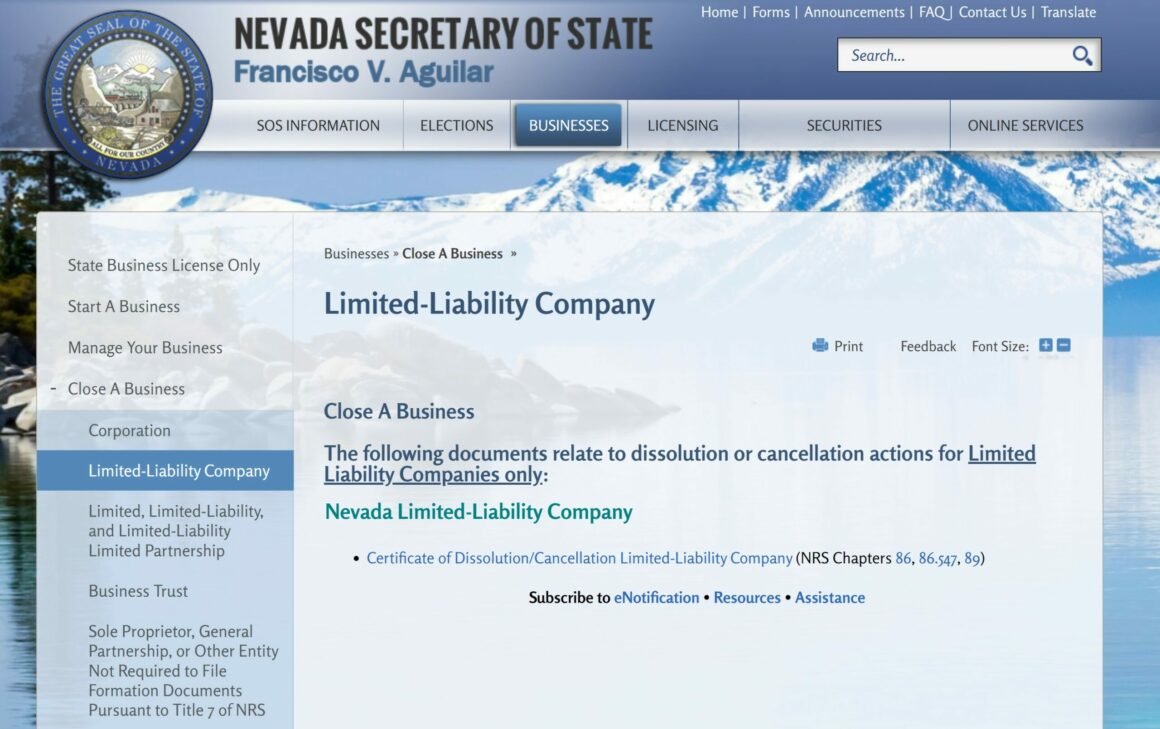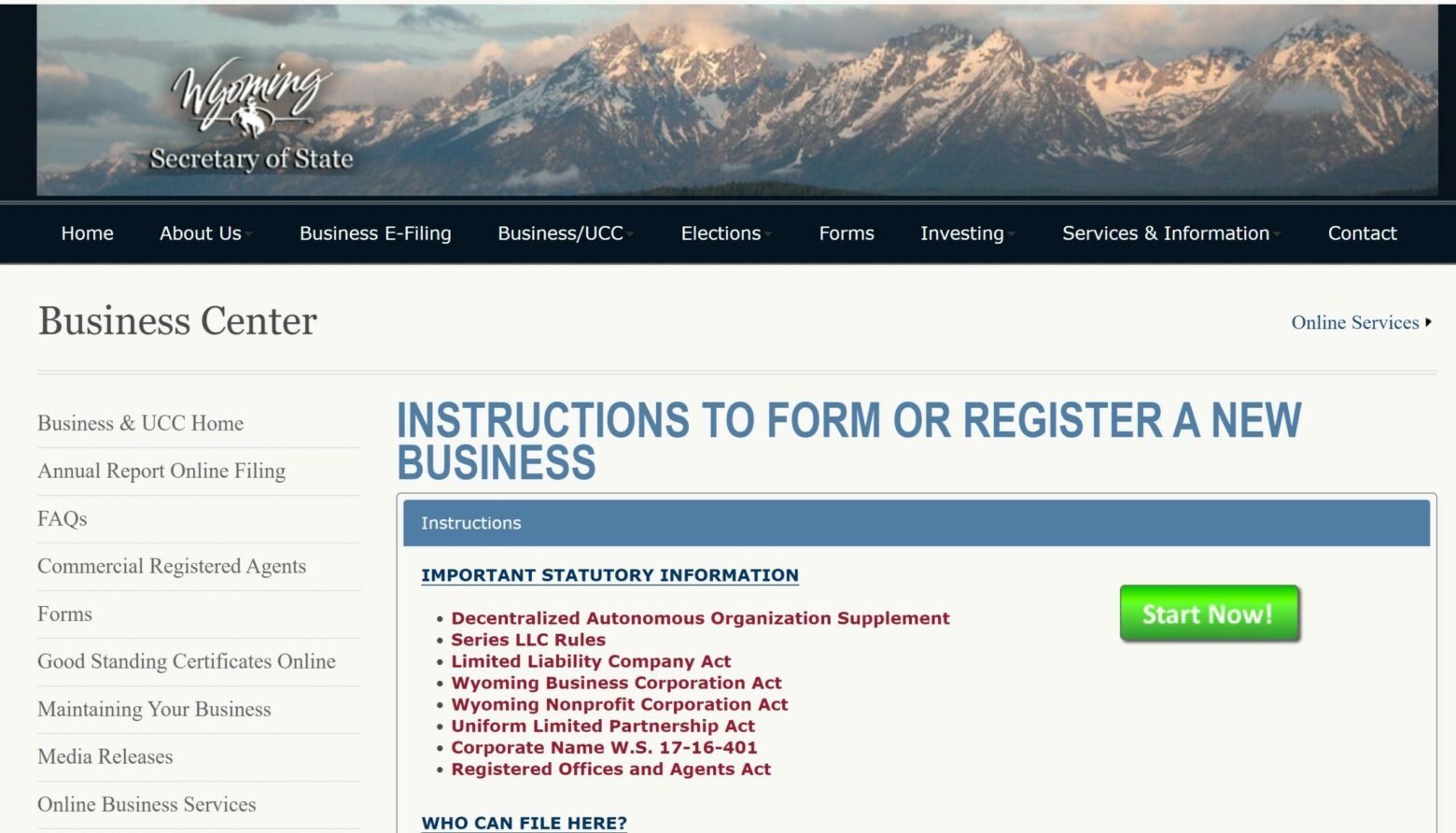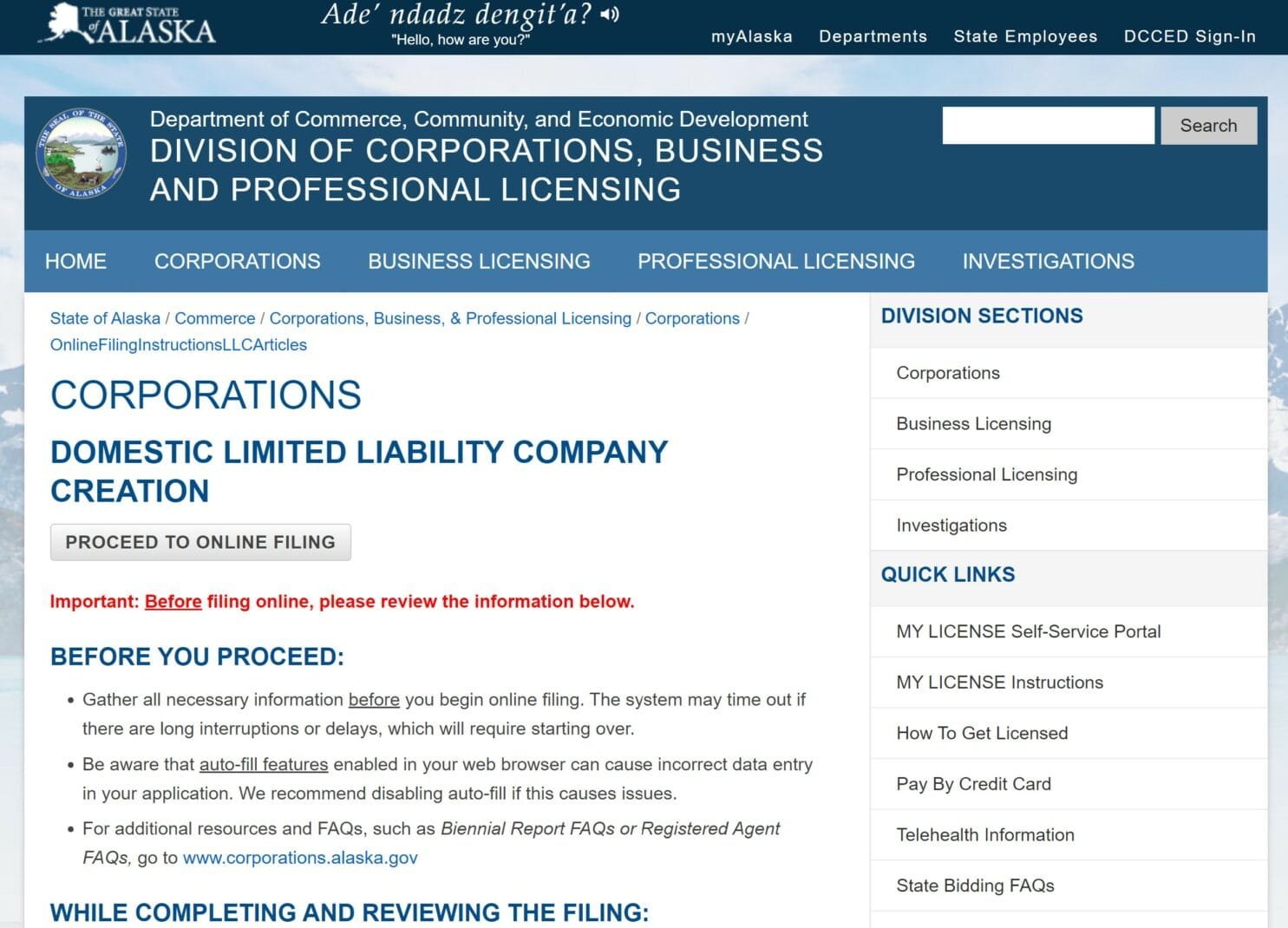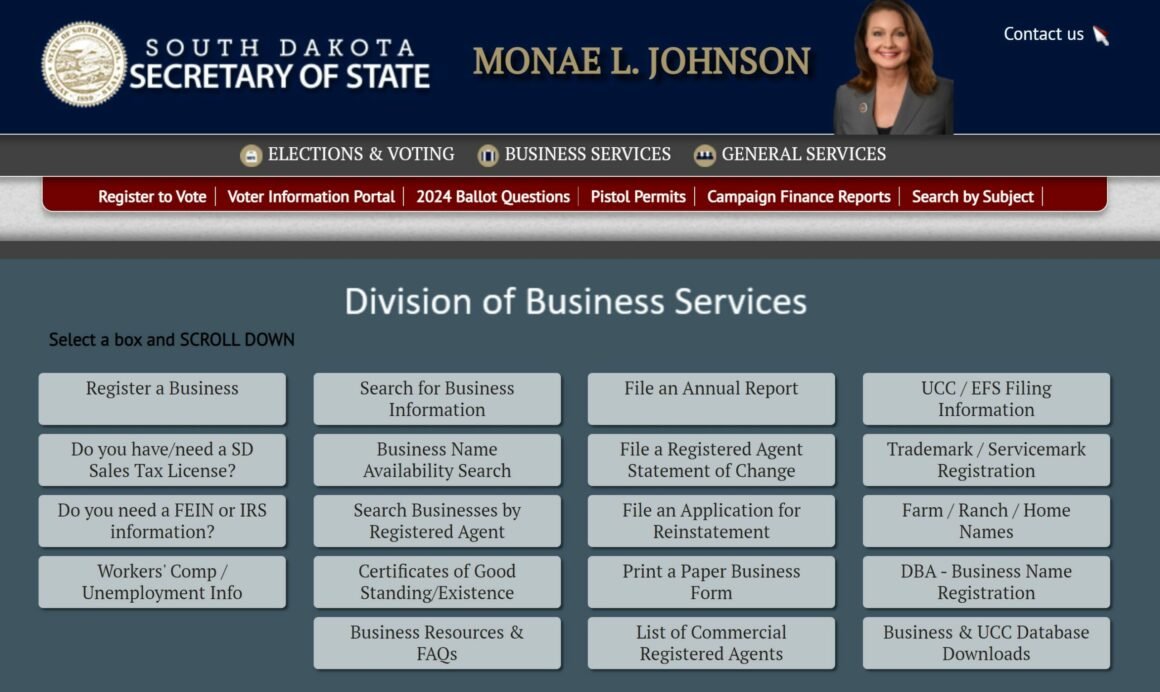Contents
ToggleDiscover the best states to form your LLC, focusing on tax benefits, privacy, costs, and legal protections for business owners.
Limited liability companies (LLCs) are a popular choice for many business owners in the U.S.
Regardless of your company’s geographical location, LLCs can be created in any state, unlike other business formats.
When compared to other states, some have substantial financial advantages.
In order to help you choose the ideal state for your company’s creation, this guide will examine the best states to form an LLC in greater detail.
6 Popular States to Form an LLC
#1 Where the Business is Located
#2 Nevada
#3 Delaware
#4 Wyoming
#5 Alaska
#6 South Dakota
| As always, seek advice from your accountant and lawyer before choosing a location for your LLC. |
Domestic LLCs and Foreign LLCs
A domestic LLC is one that was created in the state where you currently reside (your home state).
You must register your company as a foreign LLC in your home state if you incorporate an LLC outside of your state of residence.
To be clear, the word “foreign” has nothing to do with a company being run outside of the US or by someone who is not a US resident.
It simply indicates that the corporation conducts business outside of its state of residence.
Creating two LLCs – one in the state of formation and another in your home state – may be necessary if you want to start an LLC in another state.
Consider the scenario where you wish to create an LLC in Texas but reside in California. To conduct business in Texas, you would need to register that business in Texas as a foreign LLC.
You’ll have to double everything if you have two LLCs.
Also, there are two annual reporting costs, registered agents in both states and two state filing fees.
Having two LLCs will quickly increase your expenses and difficulties.
You can examine the distinctions between domestic and international LLCs in more detail to decide which is best for you.
If you’re still unsure about whether an LLC is the best structure for your company at this time, we’ve described the distinctions between an LLC and a sole proprietorship as well as between an LLC and a DBA to help.
Best State to Form an LLC
#1. The State Where the Business is Located: Your Home State
Yes, your home state is preferable in most situations. The majority of people create an LLC in their native state.
Many individuals assume Nevada is the best place to incorporate a business when they hear or read that Nevada doesn’t have corporate income taxes.
Although the latter is not always the case, the former is often the case—especially for those who reside outside of Nevada.
Nevada will be covered in more detail shortly.
Why? Keep in mind that you must still register a foreign LLC in your home state.
Hence, in addition to the additional costs associated with keeping two LLCs, you will still be obligated to pay taxes in your home state.
It is simply false information to believe that you may create an LLC in a “no-tax” state, choose to be taxed as a corporation, and avoid paying income taxes in your home state.
The majority of the time, creating an LLC should be done in your home state.
You won’t likely be able to create an LLC somewhere for less money, and you’ll probably end up paying more in the long and short runs.
Hiring an online LLC formation service can assist you in getting started, whether you decide to set up an LLC in your home state or one of the states on this list.
5 More States That Are Popular for Forming an LLC
In light of everything said above, five states stand out above the rest as the most popular places to establish an LLC, so if you reside in one of them, wonderful.
Don’t instantly believe that forming an LLC here is a good idea if you don’t reside in one of these states (for the reasons discussed above). Also, the kind of business you’re launching will matter.
For instance, a consulting firm that operates exclusively online and has no physical locations or stores might think about setting up an LLC outside of their home state.
But, a merchant with a physical location in a mall surely wouldn’t have as much freedom.
The advantages and disadvantages of creating an LLC in 5 popular states are discussed below.
#2. Nevada
Another state that attracts a lot of interest from entrepreneurs looking to avoid paying high taxes is Nevada.
This is due to the fact that neither personal nor corporate income taxes nor franchise taxes are levied in Nevada.

Having said that, Nevada does charge annual license fees and annual filing costs to business owners.
Nevada is probably the most private state for LLCs in the country. They are among the few states that permit total anonymity when filing documents publicly.
In other words, in any public registration filing, your LLC can stay anonymous.

Also, Nevada and the IRS do not have a data-sharing agreement. There isn’t any information to give because the state doesn’t have an income tax division.
Since Nevada doesn’t require annual meetings or operating agreements, maintaining an LLC is simple.
Benefits of Creating an LLC in Nevada
- No personal or corporate taxes in the state
- Free of franchise taxes
- Owners of LLCs may stay anonymous.
- No agreement for information exchange with the IRS
- There is no need for yearly meetings or operating agreements.
The drawbacks of creating an LLC in Nevada
- Costs for yearly business licenses
- Yearly filing charges
- The list of officers and directors is available to the public.
- ross income exceeding $4 million may be taxed.
As you can see, creating an LLC in Nevada may not always be the best option, particularly if you reside in another state.
The formation of a foreign LLC in your home state and the upkeep of two registered agents for every LLC are still requirements.
#3. Delaware
One of the states in the US that are known for being the friendliest to business is Delaware.
Almost 67% of the Fortune 500 companies are formed there, according to the Delaware Division of Companies.

Although this doesn’t necessarily apply to LLCs, it nonetheless makes Delaware seem appealing to companies looking to start a business there.
62,640 corporations and 248,100 limited liability companies (LLCs) and LPs/LLPs (limited liability partnerships) were formed in Delaware in 2022.
Why?
First off, compared to other states, the initial state filing fees and franchise taxes are lower. Also, Delaware doesn’t tax money earned outside of the state.
LLCs can swiftly get up and running because of the straightforward filing process. The state makes it simple to file LLC taxes and reports online after that.
You can submit your Delaware LLC’s annual reports and taxes online.
The Chancery Court is yet another distinctive feature of Delaware.
One of Delaware’s three constitutional courts is this one (alongside the Supreme Court and Superior Court).
Only commercial cases are handled in the Chancery Court. In contrast to courts that hear cases from all categories, business-related cases are therefore settled much more quickly.
The Chancey Court judges also have a lot more experience hearing commercial cases.
Shareholders, directors, and executives are not required to be residents of Delaware. Moreover, one individual may be designated for each of these positions.
Also, it’s one of the few states that permits you to have your personal information removed from the formation documents.
Benefits of Creating an LLC in Delaware
- A rapid and straightforward creation process
- Franchise taxes and minimal filing costs
- Absence of corporate income taxes (foreign LLCs that elect for corporation taxing)
- Greater privacy for your company
- Flexible organizational framework
- The business-specific legal system (Chancery Court)
Disadvantages of Creating an LLC in Delaware
- Out-of-state LLCs need to register twice
- Two registered agents are required (one for each state)
- Different legal counsel (most lawyers are only licensed in one state)
- No uniform franchise taxes
It may end up costing more to start an LLC in Delaware if you reside outside of the state than it would to do so in your home state.
Your administrative expenses can be higher in addition to needing to manage two LLCs.
You might need to hire two accountants because an accountant from your home state might not be conversant with Delaware structures.
#4. Wyoming
Another state with rules geared toward being as business-friendly as possible is Wyoming.
To begin with, they don’t subject business owners to onerous reporting requirements.

Wyoming has no corporation or personal income tax, like the other states on our list. Franchise taxes are not present either.
Wyoming gives a lifelong proxy, which is incredibly distinctive compared to other states. You can designate another individual to represent your shares or stock in a firm on your behalf by using a lifetime proxy.
This implies that Wyoming business owners can profit from complete anonymity.
In addition to having no corporation or individual taxes, Wyoming has relatively low sales tax rates.
Wyoming has the 44th-highest municipal tax rates in the nation. Hawaii and Alaska are the only two states with lower averages out of the 46 states that charge sales tax (four states don’t).
Benefits of Creating an LLC in Wyoming
Free of franchise taxes
neither a business tax nor a household tax
low rates of sales tax
Less reporting obligations for LLC owners
perpetual proxy (for owner anonymity)
The Drawbacks of Creating an LLC in Wyoming
- LLC termination (if a member dies or files for bankruptcy)
costly administration - Outside of Wyoming, asset protection may not be guaranteed in court proceedings.
Wyoming is undoubtedly a fantastic state for business owners who reside there to form an LLC.
But if you live somewhere else, do the advantages outweigh the drawbacks? You cannot completely avoid taxes because a foreign LLC must still be registered with your home state.
#5. Alaska
The last frontier is Alaska. Even though Alaska is most known for its bitter cold and thousands of miles of inhospitable land, it’s also one of the best places to start a business.

It is a desirable location to form an LLC because it is the largest state in the Union (and one of the last to enter).
To begin with, Alaska has neither a state income tax nor a sales tax. It’s important to remember, though, that cities can collect municipal sales taxes (although these are generally low).
One city in Alaska that levies a local sales tax on companies is WASILLA. The rate is only 2.5%, though.
You might also be qualified for specific tax incentives, depending on the sector in which your new business operates.
Examples include incentives for the exploration of minerals, credits for the development of frontier basins, new area development credits, qualified oil and gas service industry expenditure credits, and more.
Yet, the majority of these cities demand that you conduct actual business in the state.
Excellent loan packages are also available in Alaska for startup business entrepreneurs.
The State of Alaska announced the beginning of a new financing initiative in October 2022, along with the University of Alaska and the Alaska Small Business Development Center.
The program will receive $59.9 million in funding. Small enterprises in Alaska will have access to these monies during the following 10 years.
Yet, they are meant for companies functioning with a physical presence in Alaska, just like the tax credits.
When compared to other states, Alaska’s state fees for creating an LLC are quite low. From the website of the Alaska Department of Commerce, Community, and Economic Development, the following is a list of some typical LLC fees:
List of Alaska business forms, along with a fee infographic.
Compared to other states, registering an LLC in Alaska is affordable.
Benefits of Creating an LLC in Alaska
- No income taxes in the state
- Zero state sales taxes
- Municipal taxes are little
- Small LLC filing costs
The Drawbacks of Creating an LLC in Alaska
- Most credits go to companies that are genuinely operating in Alaska.
- Local governments are allowed to collect sales tax.
- Physically separated from neighboring states
- It’s a terrific idea to create an LLC in Alaska if you reside there and run your business there. Yet for out-of-state LLC owners, it’s not necessarily a workable answer.
#6. South Dakota
South Dakota does not impose state income taxes, like the other states on our list (a common theme on our list).

South Dakota’s 0% corporate tax rate is another benefit of setting up shop there. So, using this method to establish an LLC that is taxed as a corporation is an excellent option.
Other tax benefits that South Dakota offers include the absence of personal property taxes, inheritance taxes, and commercial inventory taxes.
The filing procedure is simple, inexpensive, and free of restrictions when done online.
Benefits of Establishing an LLC in South Dakota
- No income taxes in the state
- Corporate tax rates of zero (for LLCs taxed as corporations)
- No tax on business inventory
- Additional tax benefits (for people living in South Dakota)
Drawbacks to Creating an LLC in South Dakota
- A Local Registered Agent is Required
The majority of benefits connected with establishing an LLC in South Dakota are reserved for citizens of the state and businesses based there.
The rest of the population would still need to keep a foreign LLC in their home state.
Best State for an LLC FAQs
What is the cheapest state to form an LLC?
The cost of forming an LLC varies significantly across the United States, with fees subject to change based on legislative updates.
Typically, states with lower filing fees for forming an LLC are considered more affordable.
Among the states known for lower initial filing fees are Kentucky, Arkansas, and Mississippi, with Kentucky often cited for having one of the lowest filing fees at around $40.
However, it’s important to consider not just the initial filing fee but also annual report fees, franchise taxes, and any other recurring costs that may apply in a given state.
Some states may have low initial filing fees but higher ongoing costs, or vice versa.
What is the best state to form an LLC for non-residents and non-U.S. citizens?
Forming an LLC as a non-resident in the United States offers various strategic advantages, depending on your business goals, tax considerations, and need for privacy.
Several states are renowned for their favorable business environments, attracting non-residents to form LLCs. Here’s a brief overview of some of the best states for non-residents to consider:
Delaware
- Popularity: Delaware is a top choice for non-residents due to its business-friendly laws, strong privacy protections, and the Court of Chancery, which is well-regarded for handling business disputes efficiently.
- Tax Advantages: It does not tax out-of-state income for LLCs formed in the state, making it an attractive option for non-residents.
- Privacy: Delaware does not require the names of LLC members or managers to be listed on the formation documents.
Wyoming
- Cost-Effectiveness: Wyoming offers low filing fees and annual fees, making it a cost-effective choice for LLC formation.
- Privacy and Asset Protection: The state provides excellent privacy protection and does not require the disclosure of member or manager names in public records. It also offers strong asset protection laws.
- Tax Benefits: No state income tax on individuals or LLCs, and it’s known for being friendly to business owners.
Nevada
- Tax Benefits: Like Wyoming and Delaware, Nevada has no state income tax, corporate tax, or taxes on corporate shares for LLCs.
- Privacy: Nevada offers high levels of privacy for LLC owners; it doesn’t require the disclosure of members or managers on public filings.
- Asset Protection: Strong asset protection laws make it difficult for creditors to claim against assets held by an LLC.
Considerations
- Physical Presence: If your business will have a physical presence or significant business operations in a specific state, it may be advantageous to form the LLC in that state to avoid the need for foreign qualification in multiple states.
- Taxation and Fees: Consider not only the initial filing fees but also annual fees, franchise taxes, and any other recurring costs. Some states may have benefits that outweigh these costs.
- Legal and Financial Advice: It’s highly recommended to seek legal and financial advice tailored to your specific situation, especially if you are a non-resident. Taxation and legal implications can vary widely based on your unique circumstances.
Each of these states offers a combination of benefits that can be attractive to non-resident LLC owners, including privacy protections, tax advantages, and a business-friendly regulatory environment.
The “best” state will depend on your specific business needs, tax situation, and the level of privacy or asset protection you’re seeking.
What are some additional considerations for non-U.S. residents or non-US citizens when forming an LLC in the U.S.?
Here are a few additional considerations for non-U.S. residents and non-U.S. citizens thinking about forming an LLC in the U.S.:
EIN and Taxation: Even as a non-resident, you’ll likely need to obtain an Employer Identification Number (EIN) from the IRS for your LLC, which can require a bit more effort but is entirely possible. This is necessary for tax purposes and to open a bank account in the U.S.
Bank Account: Opening a bank account for your LLC might be challenging from abroad, as many U.S. banks require a physical presence in the U.S. Some states or banks might be more accommodating, so it’s worth researching and contacting banks directly.
Registered Agent: You will need to appoint a registered agent with a physical address in the state where you’re forming your LLC. This is a requirement regardless of the owner’s residency status.
U.S. Address: While you don’t need to be a U.S. resident or citizen to form an LLC, having a U.S. mailing address can be beneficial for administrative purposes. Some service providers offer this as part of their package.
Legal and Financial Advice: Given the complexities of U.S. tax law and the potential for tax obligations both in the U.S. and in your home country, it’s crucial to consult with a tax advisor or accountant who is knowledgeable about international business.
The process is generally straightforward, and many non-U.S. residents and non-U.S. citizens successfully form and operate LLCs in these states, leveraging the United States’ global business reputation to enhance their own business ventures.
What is the significance of choosing the right state for my LLC?
Choosing the right state for your LLC can impact taxes, legal protections, compliance requirements, and operational costs, making it a crucial decision for your business.
Are there specific states that are considered more business-friendly for forming an LLC?
Yes, some states like Delaware, Nevada, and Wyoming are known for their business-friendly regulations and tax advantages, making them popular choices for LLC formation.
What factors should I consider when selecting a state for my LLC?
Factors to consider include state tax laws, registration fees, annual report requirements, liability protection, and the nature of your business activities.
Do I have to form my LLC in the state where I live or operate my business?
No, you can choose to form your LLC in a state other than your residence or primary business location. This is known as forming a foreign LLC.
What are the tax implications of forming an LLC in different states?
State tax laws vary, and they can significantly impact your LLC’s tax obligations. You should consider state income taxes, sales taxes, and other applicable taxes.
How do I decide between a state with no income tax and one with other advantages, like legal protections?
Your decision should be based on your specific business goals. Consider the overall impact of taxes, legal protections, and annual compliance costs.
Is it possible to change the state of formation for my LLC after it’s been established?
Yes, it’s possible to change the state of formation through a process called domestication. However, it can be complex and may involve additional fees and requirements.
What are the ongoing compliance requirements in different states for LLCs?
Compliance requirements can include annual reports, fees, and other filings. Research and understand the specific obligations in the state you choose.
Can I choose a state solely based on lower registration fees, or are there other factors to consider?
While lower registration fees can be appealing, it’s essential to weigh them against other factors like taxes, legal protections, and the nature of your business.
How can I determine which state is the best fit for my LLC based on my industry?
Consult with legal and financial advisors who specialize in business formation to help you assess which state aligns best with your industry and goals.
Are there any restrictions on forming an LLC in certain states for non-U.S. residents or non-U.S. citizens?
Some states have specific requirements for non-U.S. residents or non-U.S. citizens forming an LLC. It’s important to check the regulations in the state you’re considering.
What role does the physical presence of my LLC play in choosing a state of formation?
Some states may require a physical address or registered agent within the state. Evaluate these requirements when making your decision.
Can I operate my LLC in multiple states if I form it in one specific state?
Yes, you can operate your LLC in multiple states by registering it as a foreign LLC in each state where you conduct business.
Is it necessary to seek legal advice when choosing the best state for my LLC?
While it’s not mandatory, consulting with legal professionals experienced in business formation can provide valuable insights and ensure compliance with state laws.
What are the potential downsides of choosing a state solely based on tax advantages?
Choosing a state solely for tax advantages may lead to higher operational costs or legal complexities if your business doesn’t align with the chosen state’s regulations and requirements.
How to Prepare for an LLC Application
There are several requirements for LLC filing that apply to all LLCs, regardless of where they were formed.
First, be prepared to pay the state a filing fee of some kind. They are normally in the $50 to $500 range, and payments must be made when submitting your articles of organization.
Also, you must file an Operating Agreement in several states. This is a legal document outlining the administration and management of your LLC.
It is in your best interest to submit an Operating Agreement even if your state does not compel you to do so because it will assist in preventing internal disputes among LLC members.
Be ready to choose a registered agent throughout the filing procedure.
Technically, you could designate yourself as the registered agent, but it will be much simpler for you if you choose a reputable registered agent service.
After everything is submitted, all that is left to do is wait for the state to formally recognize your LLC as a legal organization.
The precise period varies from state to state, although the common range is three to ten business days.
Your business formation provider can also help you accelerate your file in most states for an extra charge.
These FAQs should provide a good starting point for anyone considering the best state to form an LLC.
It’s crucial to conduct thorough research and seek professional advice tailored to your specific circumstances.
Wrapping Up
The rules for LLCs are not the same in all states. This guide has shown you that some states are better for LLC owners than others.
Hence, even while you might receive tax reductions in one state, you’ll still have to pay taxes on your own.
However, managing two LLCs comes with a fair share of hassles, including additional costs, multiple accountants, lawyers, and registered agents.
When it comes to establishing an LLC in a state other than your own, the advantages typically don’t outweigh the disadvantages.
As always, seek advice from your accountant and lawyer before choosing a location for your LLC.

